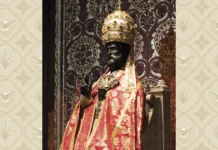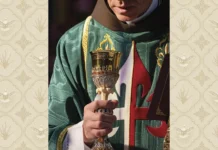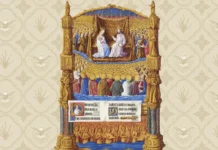It behoves pastors to diligently explain to the faithful the necessity, excellence, grandeur, purpose and fruits of the Holy Sacrifice; and thereby to encourage them to participate in it as often as possible.
A As you well know, venerable brethren, such were the goodness and kindness of our most loving Redeemer Jesus Christ, the Only-begotten Son of God, towards men, that He took on human nature and accepted to endure for our eternal salvation the harshest torments and to suffer the most cruel death on the Cross. Through infinite love, He also wished to remain with us always in the Blessed Sacrament of his Body and Blood, to be our guide and nourishment and to guarantee His divine presence among us and a sure support in the spiritual life, after His return to the right hand of God the Father in Heaven.
Sole and perpetual sacrifice renewed daily
And not content to have loved us with such sublime and truly divine love, He heaped gifts upon gifts, and then poured out the riches of His love upon us, to give us to clearly understand that having loved His own, He loved them to the end (cf. Jn 13:1)

For, declaring Himself to be the eternal Priest according to the order of Melchisedech, He instituted permanently His priesthood in the Catholic Church, and decreed that, until the consummation of the world, this same Sacrifice remain, which He offered to redeem the whole human race from the yoke of sin and the slavery of the devil, so to reconcile all things in Heaven and earth.
He also decreed that it be renewed and take place daily by the ministry of the priesthood, differing only in the manner of offering it, so that the salvific and superabundant fruits of His passion might forever be dispersed upon mankind.
In the unbloody Sacrifice of the Mass, realized by the admirable ministry of priests, the same Victim that reconciled us with God the Father is offered up. Containing within itself the legitimate power to appease to beseech and to satisfy, it “renews in a mysterious way the death of the Only-begotten Son, who having risen from the dead dies no longer. Death no longer has domination over Him. He yet lives within himself, immortal and incorruptible, but is once again sacrificed for us in the mystery of this sacred oblation.”1 It is a Sacrifice so pure that no unworthiness or wickedness on the part of those offering it can ever defile this oblation.
Overflowing with fruits for the present and future life
The Lord predicted through Malachy, divinely inspired, that this Sacrifice would be great among nations and would be purely offered from sunrise to sunset in all places (cf. Mal 1:11). This oblation overflowing with fruits embraces the present and future life.
For by this Sacrifice God is pleased and, generously granting the grace and gift of repentance, blots out even the most serious crimes. Although grievously offended by our sins, He is moved from anger to mercy, from the severity to clemency; by it the title and obligation of temporal punishment is dissolved; by it the souls of the departed in Christ who have not yet been fully purged are aided; by it temporal goods also are obtained, if they do not stand in the way of spiritual benefits; by it singular honour and cult are procured for the Saints and especially for the Immaculate and most holy Mother of God, the Virgin Mary.
Wherefore, from the apostolic tradition, we offer the divine Sacrifice of the Mass “for the universal peace of the Churches; for the right disposition of the world; for rulers, soldiers, allies; those labouring with infirmity; those oppressed by afflictions; for all who are in need; for the departed souls detained in Purgatory; with the belief that it will be a help to those souls for whom prayer is offered while we recall the holy and most awesome Victim lying before us.”2
Ceremonies and rites fitting to express the grandeur of the Mystery

Nothing is greater, more salutary, holier or divine than the unbloody Sacrifice of the Mass, in which the Body and Blood of Our Lord Jesus Christ are offered and sacrificed to God by the hands of the priests for the salvation of all. Therefore, Holy Mother Church, endowed with the inexhaustible treasure of her Divine Spouse, has always been careful and diligent in order that such a great Mystery be carried out by priests with clean and pure hearts. Furthermore, it should be celebrated with the proper splendour of sacred ceremonies and rites so that the grandeur and magnificence of this Mystery will shine forth all the more even from external appearances. This will also arouse the faithful to the contemplation of divine things hidden in such an admirable and venerable Sacrifice.
And with like solicitude and devotion, the same most holy Mother has never ceased to urge, exhort, and influence her faithful sons to frequently attend this divine Sacrifice with due piety, love and devotion. She teaches that they must at all cost be present at it on all holy days of obligation, with their minds and eyes religiously intent on that Mystery from which the divine mercy and an abundance of all good things might be acquired.
The pastors ought to offer the Holy Sacrifice for their people
As every priest, chosen from among men, is a delegate for them in everything regarding God, to offer gifts and sacrifices for sin, you well know, venerable brethren that the pastors of souls must offer the sacrosanct Sacrifice of the Mass for the people committed to their care. This obligation comes from a divine precept according to the teachings of the Council of Trent, since the same Council teaches in most express and grave words: “it is by divine mandate that all those to whom the care of souls is committed are to know their sheep and offer Sacrifice for them.”3
Furthermore, you are all acquainted with the Encyclical Letter of Benedict XIV4, in which our predecessor of fond memory speaks at length and most wisely about this obligation, explaining and confirming more fully the mind of the Fathers of Trent. In order to remove all controversies, questions, and uncertainties, he clearly and unequivocally declares that all the pastors of souls ought to offer the Sacrifice of the Mass for the people committed to them on all Sundays, and holy days of obligation, as well as on those days that, in some dioceses, have been removed from the list of holy days of obligation to allow the people to engage in servile work, with the provision that the faithful fulfil the obligation of hearing Holy Mass.
Keep watch over the zeal and sanctity of your priests!
Since, venerable brothers, you yourselves know full well the holy Sacrifice of the Mass contains a great source of instruction for the faithful, never cease to exhort pastors especially and other preachers of the divine word and those to whom the task of educating the Christian people is delegated to explain to the faithful the necessity, excellence, grandeur, purpose and fruits of so holy and admirable a Sacrifice. Likewise encourage the faithful themselves to participate as often as possible in this Sacrifice, with the faith, religion, and piety it deserves, that they may be able to obtain divine mercy and all the graces of which they have need.
Nor should you cease to encourage the priests of your dioceses to be outstanding in moral integrity, dignity, innocence of life, and sanctity. Those who alone are given the privilege of consecrating the divine Host and accomplishing so holy and awesome a sacrifice should display these qualities.
Moreover, make urgent warnings and appeals to young priests so that, meditating seriously on the ministry received from the Lord, they may fulfil it and, always attentive to the dignity and heavenly power with which they have been invested, they may put on the splendour of all the virtues and the merit of sacred doctrine; they should have their minds firmly set on divine worship, divine things, and the salvation of souls. Then, offering themselves as a living and holy host to the Lord, and as living testimonies of the Passion of Jesus, they may duly offer with pure minds and clean heart to God the expiatory Victim for their own salvation and that of all the world.
Excerpt from: PIUS IX.
Amantissimi Redemptoris, 3/5/1858
Notes
1 ST. GREGORY THE GREAT. Dialogi. L.IV, c.58.
2 ST. CYRIL OF JERUSALEM. Catechesis XXIII, n.5.
3 COUNCIL OF TRENT. Sessio XXIII. De reformatione, c.I.
4 BENEDICT XIV. Cum semper oblatas.






